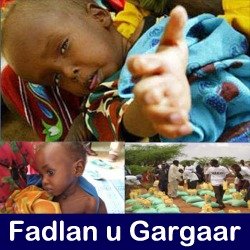The disappearance of bees is creating a scientific controversy in the West. According to the vanishing bees’ website if they continue disappearing at their current alarming rate, it is estimated that by 2035 there could be no honeybees left in the USA.
The world’s worry is in a context, as we all know a mass disappearance of any species is not without consequences to the rest of us. Fruits and vegetables, for example, that we rely on for food, need bees to grow to say the least.
If the bees’ disappearance can form this challenge to our existence, what about Somalia, where people, animals and trees alike were disappearing for two decades, and the few remaining are shackled by flourishing criminal enterprises in the form of warlords, pirates and religion traders.
A friend of mine once told me, that Somalis are beautiful and noticeable people, of course my friend did not know what I know, that beneath this angelic beauty lays a determination to destroy itself and its surrounding. Hate in Somalia became endemic; for the last twenty years, it was being reprocessed and reproduced in different forms, being retold through the eloquence of its poetic language, as though to hate is synonymous to nature.
That belief that someone is less of a being because of predetermined traits though has some roots in the culture. And if you are white, black, Arab,..etc and have been offended by some of these statements, don’t worry, in Somalia everyone is in a category. Look at Sayid Abdallah’s poetry, many refer to him as the founder of Somali nationalism and identify themselves with him with pride because of his famous battles against British and Italian colonialism. However, his equally stomach churning tales and debasing descriptions of women and other Somali clans are reiterated with pleasure. In Somalia there is the light skin and darker skin, and then as Prof Monkhouse rightly puts it, there is the soft hair and the hard hair. But also there is the soft hair of a pure ancestry and the impure soft hair, then there is the soft hair that is friendly to outsiders and the hostile that is considered nationalist, and the list goes on.
This endemic hate serves Somalia’s political elite very well, since all what they are required to do is to be skilled in the family tree and historical relationship with the rest. The trigger happy effect of cash injects for family and relatives can be a bonus, this of course requires adapting their rhetoric’s to suit funding criteria and what cash coffers would like to hear. Somalis are adaptable to changing demands, given the harsh environment we live in, but one thing does not change, that commitment to dominate at the expense of all others.
After twenty years of hate, it is apparent that the negative side of the Somali culture has become the single largest threat facing Somalia, its relationship with itself and the world, deeming Cultural Revolution even more important than any other form of social, political, or economical change.
Sadly, the few experiencing intellectual emancipation remain insensible to the threat the Somali scenario has become and instead of engaging in fruitful efforts on acceptance, diversity and inclusion, we have small talks for example about federalism which is misconstrued and misused according to who we hate at the time. This is of course a new form of indirect racism, in line with the evolution that modern racism has gone through, from more aggressive form of prejudicial behaviour of elimination and subjugation that played a major part as the political and ideological underpinning of the genocidal crimes that took place in Somalia in the last few decades, to a more subtle kind of form.
These small talks, however, are irrational since they are the byproduct of emotions. For example, take the constitutional talks that were taking place recently. Some have argued under the leadership criteria that those who want to lead the country should be a “Somali” and if with a second nationality, he / she should give it up. Of course while one can understand the demand for Somaliness in the former, giving up second nationalities at this present time, I believe, is devoid of realism and creativity. This is because what we have is not only a country where half of its population is displaced internally or externally, but also this opens a whole new Platonic dimension on identity to a task originally designed to be a last firefighting effort to rescue a nation in crisis. If you think this is bad, then wait until you hear the rest.
Others are also suggesting that we abandon the Transitional Federal constitution, to adapt and amend the sixties constitution! This is regardless of the fact that the only living person who represents those who voted on it or participated in its creation is Cabdirizak Haji Hussein, Somalia’s former Prime Minister. Despite of the character that he is, Somalia has changed many times over. That era belongs to the history books, our imagination though cannot be extended beyond the bitter memories of the past thirty years. Yet, and ironically, the current constitution is just an augmented version of that constitution.
These discussions have also this amazing ability to manipulate the process and everybody around them. Mysteriously less emphasis is put on the fact the constitution is (PROVISIONAL) not to be changed for the first seven years only. Yet mischievously, the point that says changes to the constitution can be made only to accommodate Puntland or Somaliland is magnified. Suggesting that these entities’ rights as stakeholders in this process sprang out of a vacuum, undermining in this way, the genuine grievances of loss, abuse, destitution and shattered dream of nationhood that require negotiation of new terms and conditions. Of course this is what we all know as Xaal abuur since these individuals flourish under destruction and rely on emotions based on historical divisions amongst Somalia’s major clans.
I trust that most opponents of federalism are not as much opposing the idea itself, since they themselves have lived, or live, and have links to federal states in Arabia or beyond. The problem lurks beneath that false surface and it is with whom it represents. Ironically some of them stayed in Nairobi for three years during the deliberation that preceded the current order of things, and they have sworn to fully commit to it.
After all that time and billions of dollars spent, they yet want the world to join in with their change of hearts. They are now accusing the UNPOS of taking sides, strangely in favor of the principles of the federal charter, which they themselves signed into. They are also starting beating similar drums to that of 2006, heralding the international community that has kept us alive for twenty years directly or indirectly with allegations of insincerity and imperialists intentions. These two agencies that when hate and tribalism covered in Somali nationalism and anti-Ethiopian rhetoric culminated in the rise of extremism in its most destructive forms, intervened for the sake of keeping the peace process going, removed the man that was suggested to have been the only obstacle, replacing him with the head of the Union of Islamic Courts and later the Alliance for the Re-liberation of Somalia, and then agreeing to his extension of terms of presidency.
Yet the bickering continues back home while the world has reached its conclusions, since it faces crisis of its own of dwindling water and resources and near collapse of its financial institutions. Those who are engaged in such emotionally driven small talks are missing a very important and decisive point. Their empty threats and the impending catastrophe they promise would fall on the world if their demands are not met, would only victimise Somalis, albeit Mogadisho being on the front line.
The relative peace and progress we see today in Somalia was made possible by the commitment of the international community including our neighbors. Somalia owes everything to the world, of course some more than others. The West specifically has restored our hope and dignity, when we lost our ways, gave us homes, education, provided us with citizenships and continues to support the political process. Even the relative peace we see today in Mogadisho is owed to them. Without their dedication, there would be no photo opportunities in Lido beach, no educational chances and no Turkish saviors.
Of course this is not to say that such discussions about representations and identity are not crucial to our political maturation; but that these discourses are curtailed by the necessity to meet the basic need for safety, and nation building. Indeed, we are not alone in this crisis of politics. The world is going through transformation, the break-up of established identities and affiliations, the re-emergence of old identities such as political Islam, and the forging of new identities. In the midst of this doubt and uncertainties, one thing remain clear; that is that golobalisation is a reality and that we all have to accept the interrelatedness of mankind.
Somalia as it stands now is not a problem to its people only; it is an East African, African, Arabian, Western and Eastern problem. This is not only dictated by the social and political situation in Somalia, but by the immediacy and intensity of the current global crisis. Change is inevitable for Somalia to continue and the best gift Somalia can give to the world that stood by it and believed in it is, a Somalia that is at peace with its self, with its neighbors and with the world.
I would like to appeal to the consciousness of Somalia; hate has to end, since we are too familiar with its extreme consequences. I would also call for serious measures to be taken by all Somali governments, news outlets, and international and regional partners to address the marginalisation of the voices of women, since they are equal partners in this process.
In conclusion, Somalia has an immense task ahead of her to end the transition and anarchy, while paving the way for more stable federal institutions that can allow rapid recovery to take place. Despite of the magnitude of the tasks, Somalis can do it since we have done it before in the lead up to 1960 independence and again between 1969-1977, with far much less resources than what is available today. Somalia has a new beginning but above all the opportunity to change its conditions and destiny, to preserve itself and its people.
Warsan Cismaan Saalax
warsan2001 [ A T ] hotmail.com




































comment closed after 30 days / Jawaabaha waa la xiray ama waa la joojiyay wixii ka badan 30 cisho.